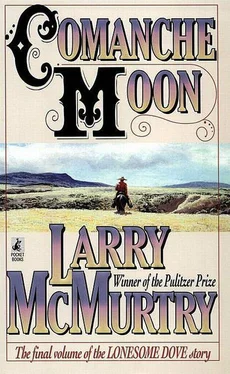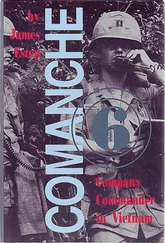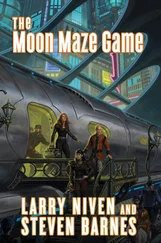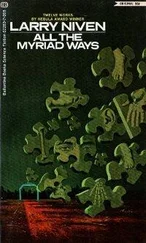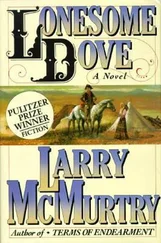Besides, the brown coat his mother was so proud of scratched his neck. There was more singing, and the grown-ups all gathered around a hole in the ground. Newt seemed sleepy--the brown coat made him hot. He held his mother's hand, put his head against her leg, and shut his eyes. The next thing he knew, Deets, who carried him home, was setting him down in his own kitchen.
Graciela, who was still alive, helped him take off the scratchy coat.
Once he had become a rich man, Blue Duck began to think of killing his father. Getting rich had been easy--the whites were on the roads in great numbers, and they were careless travellers.
They travelled as if there were no Comanches left --most of these whites did not even post guards at night. Blue Duck supposed they must be coming from lands where the Indians were tame, or where they had all been killed. Otherwise the whites would long since have been robbed and killed. They drank at night until they passed out, or else lay with their women carelessly. They were easy to kill and rob, and even the poorest of them had at least a few things of value: guns, watches, a little money; some of the women had jewels hidden away.
Often there would be a horse or two Blue Duck could add to the herd he was building at his camp near the Cimarron River.
Few of his father's band hunted that far east; Comanches didn't bother him, nor did the Indians to the east, the Cherokees or Choctaws or other tribes that the whites had driven into the Indian Territory. Those Indians were not raiders anyway: they tried to build towns and farms. They hunted a little, but they had few horses and did not go after the buffalo. A few renegades from those tribes tried to join up with Blue Duck, but the only one he allowed into his band was a Choctaw named Broken Nose, who was an exceptional shot with the rifle. Blue Duck wanted only Indians who were skilled horsemen, like his own people, the Comanches. Sometimes he liked to strike deep into the forested country, where the whites had many little settlements; for such work he needed men who could ride. He wanted to raid as the Comanches raided, only in the eastern places, where the whites were numerous and careless.
Blue Duck had five women, two who were Kiowa and three white women he had stolen. There were many other stolen women that he let his men play withfora while, and then killed. He wanted the whites to know that once he had one of their women, the woman was lost. Ermoke, the first man to join up with him once he had left his father's band, was very lustful, so lustful that he had to be restrained. Blue Duck wanted wealth but Ermoke only wanted women--he would raid any party if he saw a woman that he wanted.
Soon there were fifteen men in the camp on the Cimarron; they had many guns, a good herd of horses, and many women. Sometimes Blue Duck would get tired of all the drinking and quarrelling that went on in the camp. Once or twice he had risen up in fury and killed one or two of his own men, just to quiet the camp. He had learned from his father that the way to deal death was to do it quickly, when people were least expecting death to be dealt. Blue Duck kept an axe near the place where he spread his robes. Sometimes he would spring up and kill two or three renegades with his axe, before they could react and flee.
At other times he would simply ride away from the camp for a few days, to rest his mind, and when he left he always rode west, toward the Comanche lands. It rankled him that he had been made an outcast. He would have liked to ride again with the Comanche, to live again in the Comanche way. He missed the great hunts; he missed the raids.
The renegades he commanded seldom took a buffalo, or any game larger than a deer.
Once or twice Blue Duck rode north alone and took a buffalo or two--he did it for the meat, but also because it reminded him of a time he had gone hunting with Buffalo Hump and Kicking Wolf and the other Comanche hunters. The knowledge that he had been driven out, that he could never go back, filled him sometimes with anger and other times with sadness. He did not understand it. He had done no worse than many young warriors; he had only been trying to prove his bravery, which it was right to do.
Blue Duck decided that the real reason for his exile was that the old men feared his strength. They knew he would be a chief someday, and they feared for themselves, just as the renegades on the Cimarron were afraid for themselves.
He decided too--one night when the sleet was blowing and he was eating buffalo liver, far north of the Canadian River--t his father also feared his strength. Buffalo Hump was older; soon his strength would begin to fade. But he had been war chief of his band for a long time; he would not want to surrender his power, to a son or anyone.
His power would have to be taken, and Blue Duck wanted to be the one to take it.
In the cold morning he skinned the buffalo he had killed and took the hide back to the camp on the Cimarron, for the women to work. Only the two Kiowa women knew how to work with skins; the stolen white women had no such skills. The women were inept and so were many of the men. They were adequate when raiding white farmers, travellers with families, and the like, but in battle none of them were equal to the Comanches. They had no skill with any weapon except the rifle, and most of them were cowards, as well. A few Comanche warriors could make short work of them, a thing Blue Duck knew well.
He meant to kill his father, but it was not a thing he would attempt hastily. His father was too alert, and too dangerous. He might have to wait until his father weakened; perhaps an illness would strike Buffalo Hump, or a white soldier kill him; or perhaps he would just grow careless when on a hunt and die of an accident.
As the years passed Blue Duck's fame spread, thanks to his random and merciless killings. He was a wanted man in the eastern country, the country of trees. In Arkansas and in east Texas or Louisiana his name was feared by people who had never heard of Buffalo Hump; people who had no reason to fear a Comanche attack feared Blue Duck. He became expert at working the line between the wild country and the settled.
He knew where there were effective lawmen and where there were not. Many of his renegades were shot, and not a few captured, tried, and hung, but Blue Duck shifted away. He robbed at night, then went north into Kansas; few white lawmen had ever seen him, but all knew of him.
His restlessness did not leave him, or his frustration. He was a Comanche who was not allowed to live as a Comanche, and the injustice rankled.
Many times he went back to the Comanche country, sometimes camping in it for days, alone. He was careful, though, to stay well away from his father's people.
He didn't fear Slow Tree, but he knew that if he gave Buffalo Hump enough provocation Buffalo Hump would come after him and hunt him to death, if he could.
Blue Duck, cool in the attack, but impatient in most other aspects of life, knew that he needed to be patient in the matter of his father. He was the younger man; he had only to wait until time weakened his father, or removed him. Now and then his hot blood urged him not to wait, to challenge his father and kill him. But in cooler moments he knew that was folly. Even if he killed Buffalo Hump there were other warriors who would hunt him down and kill him.
In the east, among the forests, the name of Blue Duck was most feared. Even on the mch-travelled army roads few travellers felt safe. The gun merchants in Arkansas and Mississippi sold many guns to travellers who hoped to protect themselves from Blue Duck, Ermoke, and their men.
Many of those travellers died, new guns or no; Blue Duck's wealth grew; but, despite it, he still went back, every few months, to ride the comancher@ia, the long plains of grass.
Читать дальше
